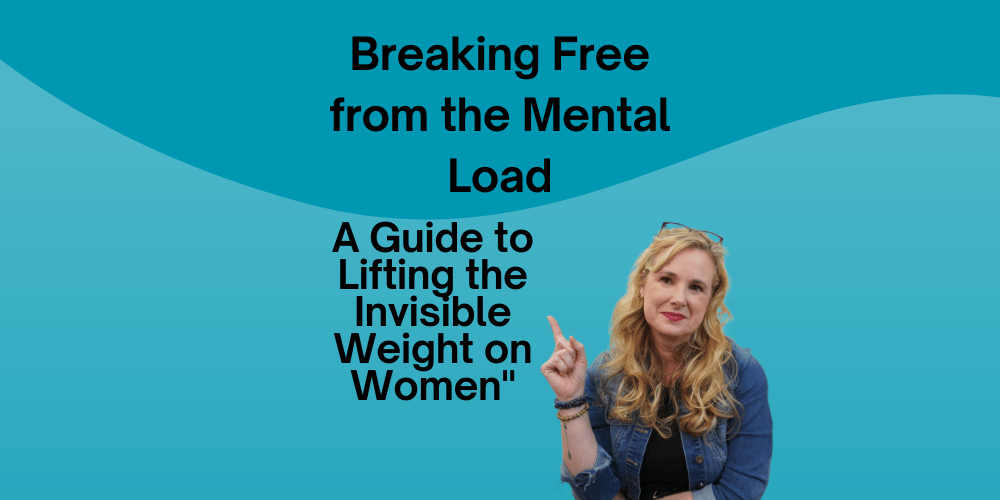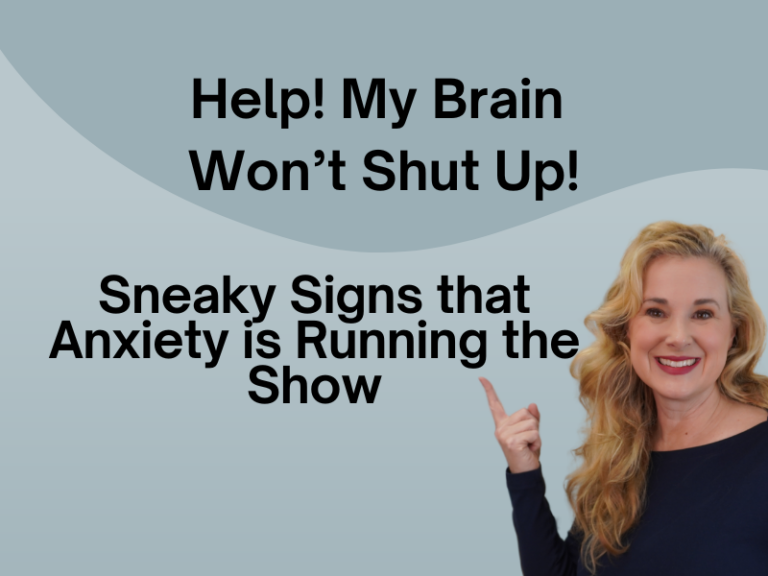
Let’s be real: no one really prepares us for this stage of life. Sure, we get the basic rundown—hot flashes, night sweats, maybe a few mood swings—but the reality of perimenopause, menopause, and midlife is so much more than that. It’s not just about the physical changes; it’s about how those changes ripple through every corner of our lives—our emotions, our relationships, and even how we see ourselves.
If you’re feeling exhausted, overwhelmed, or not quite like yourself lately, I want you to know: you’re not alone. Let’s talk about some of the biggest mental health challenges women face during perimenopause, menopause, and mid life, because you deserve to feel seen, heard, and supported.
1. Why am I so emotional all of a sudden?
Raise your hand if you’ve ever burst into tears over something completely random—like a TV commercial, a song on the radio, or a slightly snarky email from your boss. It’s not just you! During perimenopause and menopause, fluctuating hormones—especially declining estrogen—can wreak havoc on your emotional regulation. Estrogen plays a big role in stabilizing your mood by interacting with brain chemicals like serotonin and dopamine, so when it starts to dip, your ability to stay calm, cool, and collected can take a serious hit.
One minute you’re fine, and the next, you’re crying in the car or snapping at your partner over something you don’t even care about. These emotional ups and downs are totally normal, but let’s be real—they don’t feel great. It can leave you feeling out of control, like your emotions are calling the shots instead of you. And when you’re already juggling work, family, and the chaos of daily life, this extra layer of unpredictability can make everything feel overwhelming.
The key to understanding these sudden emotional surges is knowing that they’re not a personal flaw—they’re your brain and body trying to adjust to big hormonal changes. The good news? With the right support and strategies, like therapy or mindfulness techniques, you can regain a sense of balance and feel more in charge of your emotions again.
2. Old Wounds, New Feelings
Here’s something no one really talks about: menopause & midlife can bring up old, unresolved emotional pain. Maybe it’s grief you never fully processed, or trauma you thought you had buried long ago. As estrogen declines, your brain becomes more sensitive to stress, and sometimes, those deep emotional wounds rise to the surface.
It can feel unsettling, like a weight you weren’t expecting to carry. But here’s the truth: this isn’t a setback. It’s actually an opportunity—a chance to heal those old wounds and free yourself from the emotional baggage you’ve been carrying for years. Therapies like EMDR and Brainspotting are especially helpful in navigating this, because they go beyond talking and help you release the pain on a deeper level.
3. The Exhaustion Is Real
You’ve probably heard people joke about “menopause brain” or “brain fog,” but when it happens to you, it’s no laughing matter. Forgetting appointments, struggling to find the right words, or feeling like you’re walking through life in a daze—it’s frustrating and, frankly, a little scary.
Add in the physical exhaustion from night sweats or insomnia, and it’s no wonder so many women feel like they’re barely holding it together. The exhaustion isn’t just physical; it’s emotional, too. You might feel like you’re constantly “on,” taking care of everyone else, while your own needs get pushed to the back burner.
4. “Who am I now?”
For many women, this stage of life comes with a sense of loss—of identity, purpose, or the roles you’ve played for so long. Maybe your kids are grown and don’t need you in the same way. Maybe your career doesn’t feel as fulfilling as it used to. Maybe you’re just not sure who you are anymore, now that your body and emotions are changing so drastically.
This shift can feel isolating and even disorienting. But it’s also a chance to rediscover yourself—to let go of the pressure to be everything to everyone and focus on what really matters to you.
5. Irritability and Anger: When Little Things Make You Want to Scream
Here’s a truth not enough people talk about: menopause & mid life can make you angry. Like, really angry. Maybe you’ve always been the calm one, the peacekeeper who brushed things off—but now, the smallest things set you off. Someone cuts you off in traffic, and your blood pressure shoots through the roof. A casual comment from a family member makes you want to scream.
This sudden irritability can feel confusing, even a little scary. But it’s also completely normal. Hormonal fluctuations during menopause impact how your brain processes emotions, making you quicker to anger or frustration. But here’s the thing: that anger is telling you something.
Often, that irritability is a signal that something deeper is going on—maybe you’ve been overextending yourself, saying yes when you mean no, or ignoring your own needs for too long. It’s your body and mind’s way of saying, “Enough already!”
Instead of fighting it, try tuning into it. What’s the source of your frustration? Is it something you can address by setting boundaries or letting go of perfectionism? And if the irritability feels like it’s getting the best of you, therapies like EMDR or Brainspotting can help you process the emotions that are bubbling to the surface so you can regain a sense of calm and control.
6. The Pressure to “Keep It Together”
Let’s be honest: as women, we’ve been conditioned to keep it all together, no matter how much we’re struggling. Maybe you tell yourself, “It’s just menopause,” or “Other women deal with this, so I should be able to handle it too.” But brushing it off or powering through only makes the struggle harder.
The truth is, this stage of life can be incredibly challenging, and there’s no shame in admitting that. In fact, it’s one of the bravest things you can do—to recognize that you deserve support, healing, and care just as much as anyone else.
7. People-Pleasing Doesn’t Work Anymore (And You’re Over It)
Something surprising happens during perimenopause and menopause—you start to realize that the old ways of “keeping the peace” or making everyone else happy just don’t feel good anymore. That constant effort to people-please, avoid conflict, or worry about how others may judge you? It starts to feel exhausting—and honestly, irritating.
Maybe you’ve spent years putting others first: making sure your kids were happy, your partner was supported, your coworkers got what they needed. And while there’s a lot of love in that, there’s also a cost. It can leave you feeling drained, like there’s no time or energy left for yourself.
But now, something has shifted. The little voice inside you is getting louder, saying, “I’m done.” You’re done biting your tongue, smiling through frustrations, and twisting yourself into knots just to make others comfortable. You’re starting to crave something different: authenticity.
When you ignore that need for authenticity, it shows up in other ways. Maybe you notice you’re quicker to snap at people or find yourself feeling resentful or irritable. That’s not a failure on your part—that’s your body and mind sending you a clear signal: it’s time to stop pretending and start living for you.
Choosing You Isn’t Selfish—It’s Necessary
It might feel uncomfortable at first—especially if you’ve spent years prioritizing others—but choosing to be authentic is one of the most powerful gifts you can give yourself. And here’s the thing: when you show up as your true self, unapologetically, it doesn’t just benefit you. It teaches the people around you how to respect your needs and see you for who you truly are.
Therapies like EMDR or Brainspotting can help you unpack those old patterns of people-pleasing and let go of the fear of being judged. These tools can help you heal the parts of you that believed you had to be “perfect” to be loved or accepted, so you can finally feel free to live on your own terms.
You’ve spent enough of your life worrying about everyone else. It’s time to focus on you. And the best part? When you do, you’ll find that the right people will meet you there—with love, understanding, and respect. The ones who don’t? Well, you won’t have the energy to worry about them anymore—and that’s a beautiful thing.
You Don’t Have to Go Through This Alone
If any of this resonates with you, I want you to take a deep breath and remind yourself: you’re not broken. You’re not weak. You’re navigating one of the most profound transitions of your life, and it’s okay to feel all the feelings that come with it.
The good news? You don’t have to do it alone. There are tools, resources, and therapies that can help you feel like yourself again—or maybe even discover a version of yourself that’s stronger and more at peace than ever before.
Therapies like EMDR and Brainspotting, for example, can help you process the emotional weight of this transition, whether it’s unresolved trauma, overwhelming stress, or simply the mental load of doing it all. These approaches don’t require you to relive every painful moment; instead, they help your brain and body release what’s been holding you back so you can move forward.
So, if you’ve been feeling lost, overwhelmed, or just plain tired, know that there’s hope. Menopause isn’t the end of your story—it’s the beginning of a new chapter. One where you can prioritize yourself, heal the pain you’ve been carrying, and step into a life that feels more fulfilling, balanced, and authentically you.
You’re not alone in this journey, and you don’t have to do it on your own. When you’re ready, there’s help—and healing—waiting for you.



